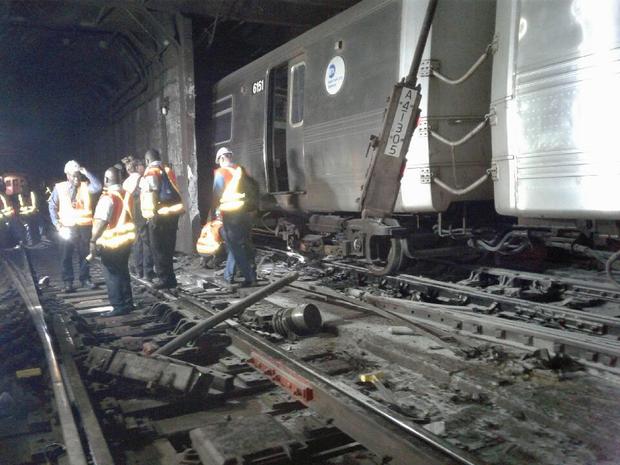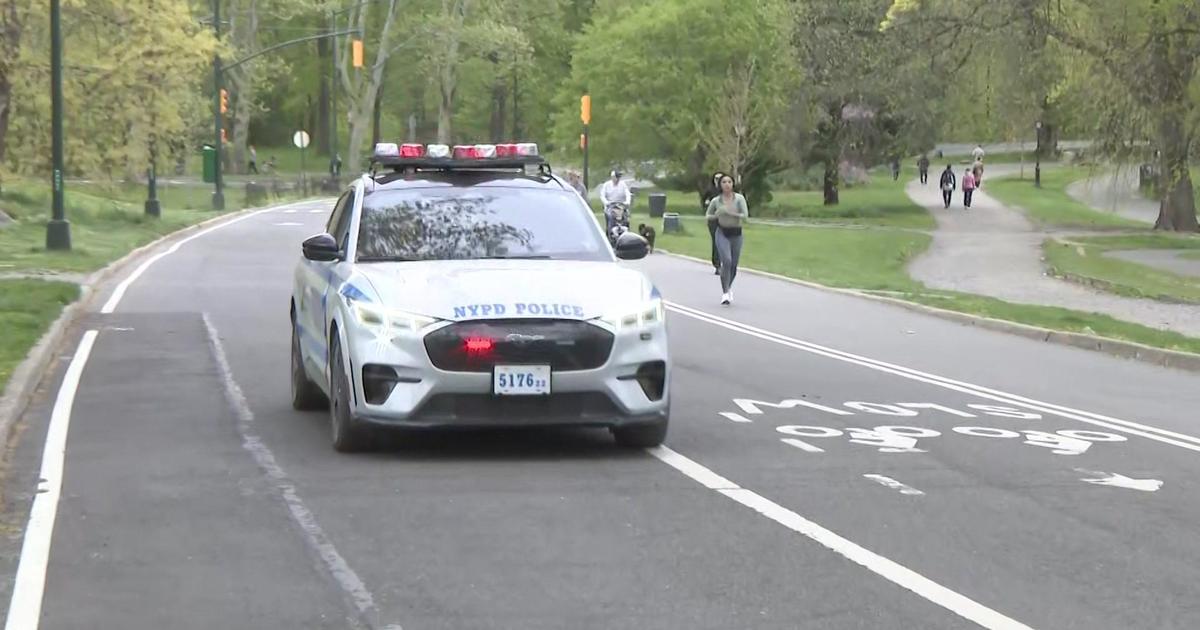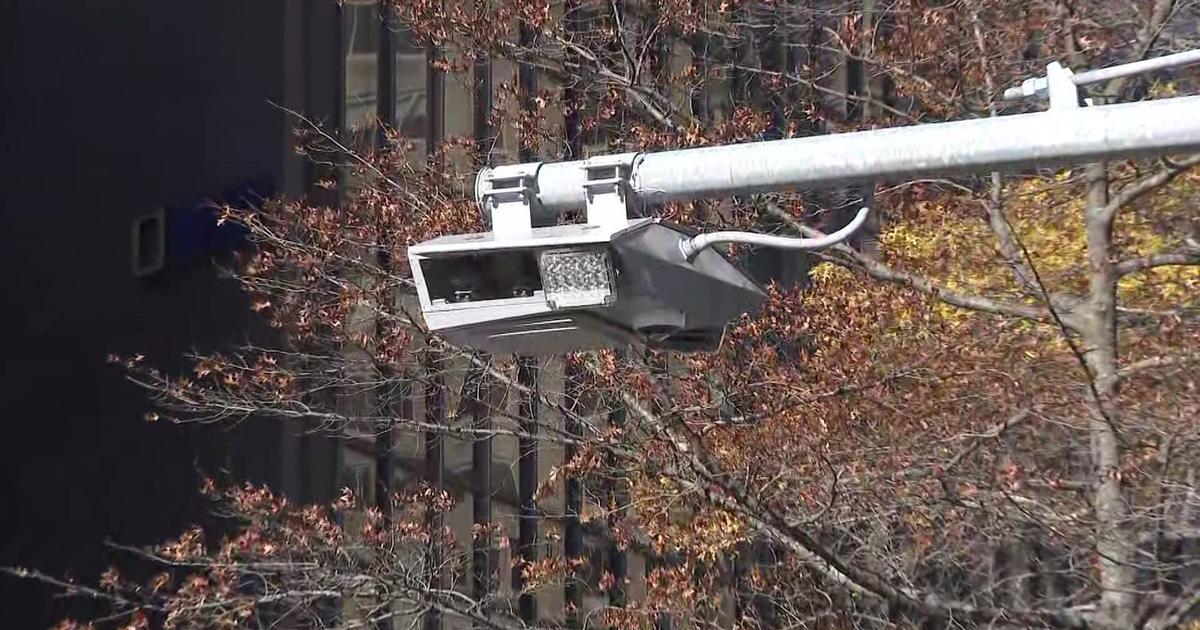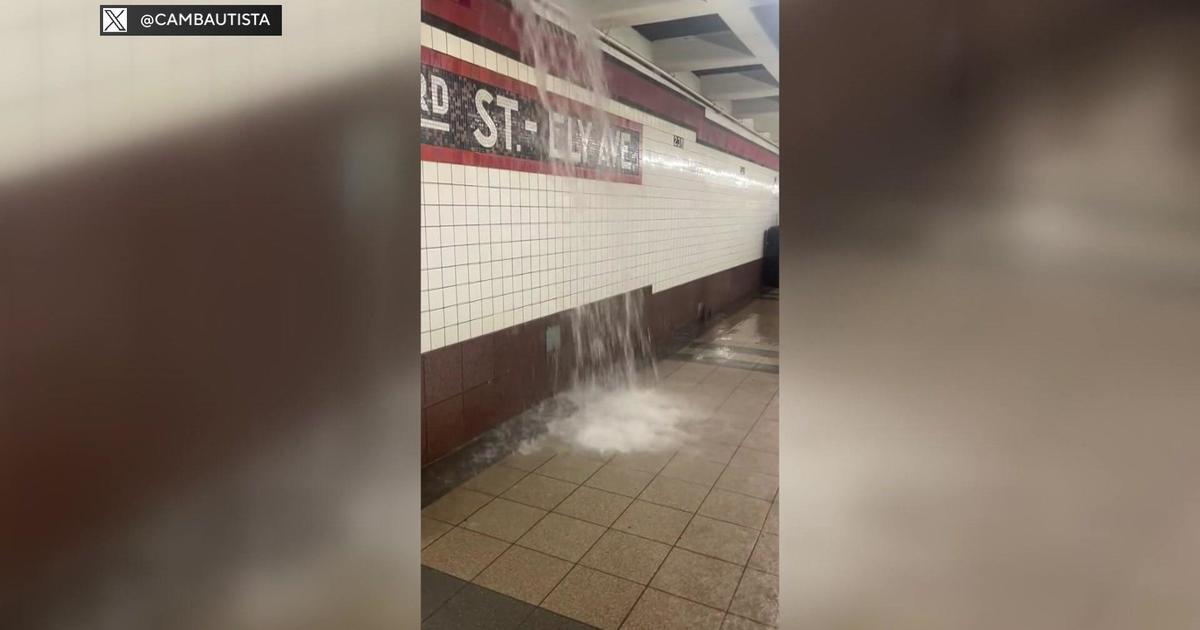Subway Derailment In Harlem Caused By 'Human Error,' MTA Says
NEW YORK (CBSNewYork) -- The subway derailment that left nearly 40 people injured and led to major disruptions and delays Tuesday was caused by "human error," the MTA says.
A southbound (A) train struck the wall of the tunnel at around 9:48 a.m., causing two subway cars to derail at West 128th Street officials said.
Late Tuesday night, the MTA released a statement, saying the cause of the derailment "appears to be human error, not a track defect."
"The preliminary investigation of Tuesday morning's train derailment indicates the cause was an improperly secured piece of replacement rail that was stored on the tracks," the statement said. "Storing equipment in between tracks is a common practice employed by railroads across the country to accelerate rail repairs. The key to this being an effective and safe practice is making sure that the extra equipment is properly bolted down, which does not appear to have happened in this case."
"The emergency brakes automatically went on. The train bucked forward, it bucked backward. In the process of doing that, two of the - there's eight cars on this train - two of the cars derailed. They scraped the side of the wall," MTA Chairman Joe Lhota said earlier in the day.
"It's an unusual kind of derailment," said Dr. Robert Paaswell, a professor of civil engineering at City College and a former head of the Chicago Transit Authority. "First instinct is -- did somebody pull the brakes? I mean, that's the way they would normally go on. Or did the train hit something, did it go through a red signal? Or was there debris on the track?"
"Any time you have to replace track and replace signals, it's not good," he added. "Replacing track -- it takes time."
Two of the A train's cars made it into the 125th Street station, though "some people unfortunately decided to go out through the back way, which we never encourage," Lhota said. "They decided to do that and took it into their own hands instead of the safe way."
Thirty nine minor injuries were reported, according to FDNY Commissioner Daniel Nigro.
WEB EXTRA: Photos Of The Derailment
The derailment caused damage to the tracks and disrupted service. It wasn't clear how long repairs would take.
"Looks like there is track damage. Looks like there is switch damage," said MTA Interim Executive Dir. Ronnie Hakim. There was also damage to the tunnel wall.
The derailment caused a small fire and smoke conditions, officials said.
Some 800 people were on four trains that were stopped as a result of the derailment, and some 500 evacuated on the tracks, Nigro said.
PASSENGERS DESCRIBE IMPACT, AFTERMATH
"We were on the express track from 145th to 125th... All of a sudden it was like the train just started like banging against the walls of the tunnel," one passenger told CBS2's Emily Smith. "It was going up and down. It was sort of like a runaway roller coaster -- like a bucking horse."
"It started rocking all over the place. People started falling off their chairs. It was crazy, like a movie," Edgar Gonzalez said.
"My head was more thinking about like 'Wow, I just got into an accident on the train.' I was pretty shaken up, I was scared," one woman told CBS2's Jessica Moore.
"I had to brace myself on a pole so my head wouldn't slam into the pole," she added.
"The lucky thing is that we were only a couple of hundred feet from the platform," the passenger said. "It was like riding on the back of a bull."
"People were in and out of their seats all over screaming, power went out and then it stopped and the car filled up with smoke" he added. "We didn't know what was going on."
Once the train came to a halt, people were checking on one another, one passenger said.
"What struck me is that everyone was just going around asking 'Are you OK? Are you OK?'" Michelle Ayoub told Smith. "I don't want to get back on the train -- for a long time."
"I've never been in that situation where I felt like you could die," she added.
All passengers on the original A train were evacuated.
The Transport Workers Union praised the actions of the crew aboard the derailed train.
"Our crew reacted as they were trained to do. Their outstanding performance kept people calm in the midst of a really chaotic situation," said Kia Phua of TWU Local 100.
Several other trains which were also stopped as a result of a the derailment were also evacuated, though the evacuations took time.
"It was crazy, we were stuck for over an hour," one passenger said.
"The worst experience of my whole life. My whole life," one woman said.
DERAILMENT CAUSES SERVICE DISRUPTIONS
Late Tuesday night, the MTA said the following service changes were in effect:
• (A) trains are running local in Brooklyn and Manhattan between Euclid Avenue and 168th Street in both directions.
• Some northbound A trains are running express from Canal Street to 59th Street-Columbus Circle.
• (B) trains are running along the F line from 47-50 Streets-Rockefeller Center to Lexington Avenue-63rd Street, then running on the Q line to 96th Street.
• (C) train service is suspended between Euclid Avenue and 168th Street in both directions.
• (D) trains are running local between 59th Street-Columbus Circle and Bedford Park Boulevard in both directions.
Riders should expect delays on the A, B, C, D, E, F and M lines.
Click here to check current MTA conditions.
It's unclear when normal service will resume, but the MTA said employees will be working all night to have it restored by the morning rush.
The MTA has to remove the train to see the extent of the damage and it is speaking with the operator to determine the cause, 1010 WINS' Samantha Liebman reported.
"Our goal is to get back up and running as quickly as possible," Lhota said.
"Our members are working as fast and safely as possible to bring the system back to normal," said TWU Local 100 official Tony Utano.
Meanwhile, the MTA advised people to use the 1 train as an alternative.
Platforms were packed Tuesday evening as people headed home. But as CBS2's Reena Roy reported, they were much worse in the morning.
"What's going on? We're going to work, we don't have no time," one woman said.
"I left my house at 9-o-clock. What time is it? After 12. I'm not at work yet," rider Gerry Danzy said.
"I am worried about the office. They can tell me today, 'you are working a half day and you will be paid less hours,' or something like that," a man added.
Long stretches of the A, B, C and D lines were completely shut down for most of the day.
"I think I've taken like two trains now. And I'm just going to take the bus, because the trains are so packed it's not worth it," commuter Bridgette McGuire said.
"I just came from the 4 train. Went from that train, to another train, to get the D train. Now I'm here, I'm confused. I don't know what to do," rider Derrick Hairston said.
"It was just insane. People were yelling, angry, smushed together like sardines," a woman said.
"It was really hot, everyone's sweaty. I mean, that's like an added level of stress and anxiety," a man added.
"You've got people going this way, this way, this way. They don't even know where they're going. They're not telling nobody where they're going," Danzy said, adding she felt "terrible."
"I'm just going to get on the 1, and hopefully I can get all the way home. We'll see," commuter Caitlin Bricketto said.
There were shuttle buses and MTA employees on hand to help passengers, but people said the constant problems need to end, begging officials to do something.
"It's going to very inconvenient for everyone in this neighborhood," Max Florentino, of Harlem, told WCBS 880's Marla Diamond. "They just raised the fare not too long ago, and since they raised the fare, there's been at least three accidents -- three derailments and the MTA."
"The MTA needs to get its act straight. I've been riding the train for like 20 years now, and it just doesn't get better," one man said.
"That's not right! It's completely not right," a woman added.
"I'm from Chicago and I feel like I've never experienced transportation dysfunction until I moved here," McGuire said. "How does one train shut down four other trains? That's just crazy to me."
"Pretty aggravated. There's no other way to explain it," a man said. "It's New York, stuff happens and we just have to deal with it I guess."
Lhota said despite all the recent challenges and service disruptions the MTA has faced he is attempting to restore confidence in the organization.
"We transport millions of people every day," Lhota said. "We want to do it safely and we want to do it quickly and efficiently as we possibly can, the way we have always done and the way we will continue to do."
Lhota added that he is conducting a top to bottom review of MTA operations and "get the Transit Authority and railroad in a state where people feel comfortable. I want everyone to feel comfortable that they will get to work on time, get to school on time, get to their appointments on time."
New York Gov. Andrew Cuomo stood behind Lhota in a statement.
"While the investigation is ongoing, this morning's subway derailment is an unacceptable manifestation of the system's current state. New Yorkers deserve better. We are grateful to the first responders for their able assistance. It is my expectation that with new leadership brought by Joe Lhota, the MTA will address the fundamental issues plaguing the transit system and overhaul the organizational structure of the MTA," he said. "As I have told Joe, any support the MTA needs to get through this crisis, will be provided."
Meanwhile, city officials, like Ydanis Rodriguez, were outraged.
"Today, as chairman of the Transportation Committee of the New York City Council, I am calling to put politics aside and to recognize that we have a big responsibility to run a transportation system that New Yorkers and tourists deserve," he said.
"Last week, it was people jumping off. Today, it's a derailment. Tomorrow, it will be something worse, because we haven't fundamentally addressed the MTA crisis, which is the fact that they've been neglected and underfunded," New York State Sen. Michael Gianaris said.




